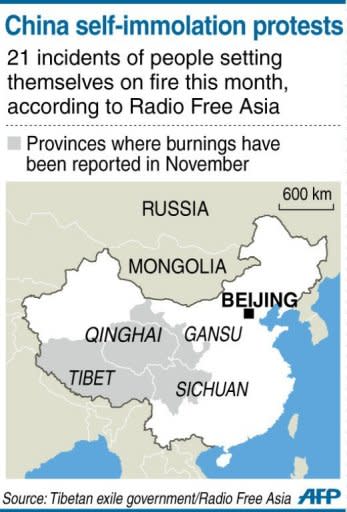Four more Tibetans set themselves alight in China
Four more Tibetans have set themselves alight in protest at China's rule, overseas media said Tuesday, taking the total to more than 20 this month. The spate of burnings in recent weeks began in the run-up to the Chinese Communist Party's set-piece congress, where Xi Jinping was named as the organisation's general secretary in a 10-yearly power handover. According to the US-based Radio Free Asia, the latest incidents on Sunday and Monday -- two in Gansu province, one in Qinghai and one in Sichuan -- brought the number to 21 this month and 85 since 2009. Three of the latest victims, all in their teens or early 20s, died and one person was taken away by police with his condition currently unknown, it said. In a statement London-based campaign group Free Tibet gave details of three incidents. "We are now receiving reports of self-immolation protests on an almost daily basis," said Free Tibet director Stephanie Brigden. "Allied to the many other forms of protests which Tibetans are undertaking -- marching, leafleting, displaying banned images and exerting Tibetan culture -- it forms an unimpeachable argument for an end to Chinese occupation." The burnings came as authorities in a Tibetan area of Qinghai province in northwestern China apparently fuelled anger by issuing school booklets ridiculing the acts, Free Tibet added. As many as 1,000 students from a school in Chabcha county took part Monday in a protest believed to have been triggered by the booklets, with up to 20 hospitalised after police and security forces arrived, it said. "Although we cannot confirm whether security forces beat students or not, it would appear that the change in Chinese leadership has not led to a change in the brutality which passes for government in Tibet," Brigden said. One Tibetan in Chabcha county confirmed to AFP by phone that there was a protest on Monday but she was unaware of any clashes with police. Phones at government and police offices in Chabcha were not answered on Tuesday. Most of the 85 who have set themselves alight since 2009 have died, rights groups said. Beijing has accused exiled Tibetan Buddhist leader the Dalai Lama of inciting the self-immolations. He has preferred to remain neutral on the acts in public statements, but has urged the Chinese government to investigate, saying: "China does not look into it seriously and tries to end (the incidents) only by criticising me." Many Tibetans in China accuse the government of religious repression and eroding their culture, as the country's majority Han ethnic group increasingly moves into historically Tibetan areas. China rejects the allegation, saying Tibetans enjoy religious freedom. Beijing points to huge ongoing investment it says has brought modernisation and better living standards to Tibet.




